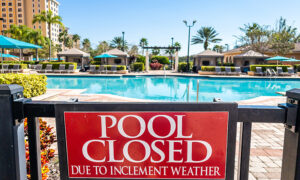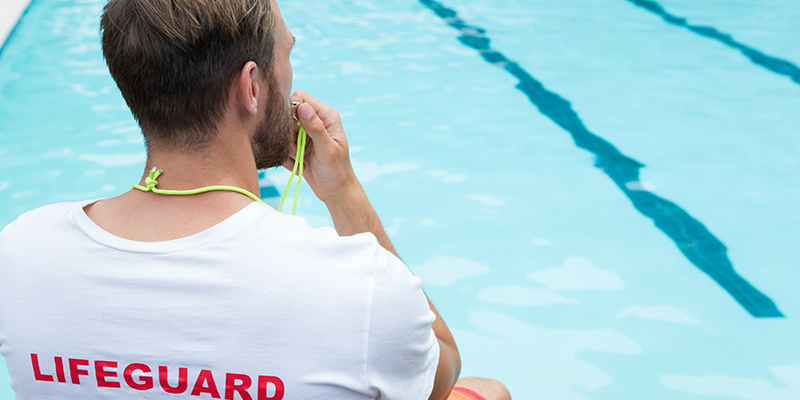Is hiring an HOA pool lifeguard necessary for safety? Homeowners associations must act in the residents’ best interest. However, this doesn’t necessarily mean every community with a pool needs one. HOAs must consider several factors before they hire an HOA pool lifeguard.
Should You Hire an HOA Pool Lifeguard?
Do HOA pools have to have lifeguards? It often depends on the specific circumstances of the community. A dedicated lifeguard has its pros and cons. Before your community rushes to make a decision, consider these factors first.
1. Safety
Drowning is always a big problem when it comes to communities with pools. After all, it’s one of the leading causes of death for young children. That’s why it may be wise for communities with families to hire an HOA pool lifeguard.
A lifeguard can patrol the perimeter, prevent accidents, and save swimmers in case of an emergency. This protects the members from drowning. It also shields the HOA from liability.
2. Training and Certification
An HOA pool lifeguard has to have proper training and certification. Don’t hire someone who claims to be a lifeguard without the proper credentials. Otherwise, you may face liability down the road if a problem arises.
If you’re hiring lifeguards through a vendor, ask the vendor for the lifeguard’s certification. The same is true if you choose to employ an independent lifeguard.
3. Insurance
It’s best to hire a lifeguard with proper insurance coverage. This can keep the homeowners association from encountering legal trouble if something happens.
Often, vendors that provide lifeguards do have insurance coverage. If you hire through a vendor, chances are they’ll be able to give you indemnification when issues occur. However, if you choose to hire independent lifeguards, seek separate lifeguard insurance. It may cost more, but it’ll save you from trouble later on.
4. Cost
Hiring an HOA pool lifeguard may be the best option in some cases. However, certified lifeguards are often quite expensive. This could raise the community’s assessments and increase the residents’ financial burden.
Professionally trained lifeguards for HOAs are also not always available. They may be quite hard to find. Even if you do find one, chances are they charge a high price. You might even be tempted to hire an uncertified lifeguard instead.
When in doubt, only hire a lifeguard if the budget can accommodate it. Don’t hire someone untrained or uncertified, as that could cause more problems down the road. Furthermore, remember to factor in not only the cost of the lifeguard’s compensation but also the cost of insurance, if any.
5. Liability
 An HOA pool lifeguard is supposed to save swimmers when they drown. However, if the lifeguard doesn’t have the right training or skills to do so, they might fail at this very task. The HOA may face liability if it hires a lifeguard with no certification. That’s why it’s important to hire someone with training.
An HOA pool lifeguard is supposed to save swimmers when they drown. However, if the lifeguard doesn’t have the right training or skills to do so, they might fail at this very task. The HOA may face liability if it hires a lifeguard with no certification. That’s why it’s important to hire someone with training.
Moreover, it’s best to consult with an HOA attorney about potential risks involving lifeguards. Does your association need to hire one? Or is it best to forego the lifeguard? Some residents may take legal action if an accident happens. Consult with your attorney to ensure the HOA is prepared for potential lawsuits.
6. Size of Community
If your HOA consists of only a few homes, a lifeguard may be unnecessary. Smaller communities are often easier to manage and pose fewer safety risks. However, if your HOA has a large population, it may be worth considering. Larger communities are more difficult to manage. It’s not easy to ensure the safety of all residents without one.
7. Legal Requirements
Some states may require the presence of lifeguards under certain conditions. Review the relevant local and state laws with your attorney to ensure compliance. You don’t want to get into legal trouble because you didn’t hire a lifeguard when you were supposed to.
Moreover, remember to review the community’s governing documents. If the CC&Rs or Bylaws require a lifeguard, the HOA board must hire one.
8. Enforcement of Pool Rules
Most communities will have pool rules. These could include implementing pool hours, age restrictions, and rules on swimming alone. However, enforcing these rules is difficult as the board members aren’t always stationed around the pool.
This is where an HOA pool lifeguard can come in handy. These lifeguards can serve as authority figures who can enforce these rules. The residents are less likely to commit violations when someone is watching.
What if the HOA Cannot Afford a Lifeguard?
If the association can’t afford to hire a lifeguard, there are alternative measures the board can take to ensure safety.
1. Hire a Pool Attendant
The board may consider hiring an HOA pool attendant instead of a lifeguard. These attendants may not have the right training to jump in and save lives when someone drowns. However, they can keep an eye on pool activities and keep it clean.
With a pool attendant, residents and their guests can easily find what they need. They know who to turn to when they have questions. Moreover, the pool attendant can enforce the pool rules in place of the lifeguard.
2. Post Clear Signs
Most state laws and governing documents require the HOA to post clear signs around pools. These can include signs indicating pool rules and usage hours. Post them in a visible spot and make them easy to read. This can keep the HOA from facing liability later on.
These requirements may be in place whether or not you have a lifeguard. However, signs become even more vital when there’s no lifeguard. Apart from posting the pool rules, post signs indicating no lifeguard is on duty.
3. Put Flotation Devices Nearby
It’s best to put flotation devices near the water. This can help save the life of a swimmer in case of emergencies. It can make a huge difference in terms of pool safety.
4. Tighten Security
 Consider adding lockable gates around the area if your HOA has a pool. This can help the board better regulate pool hours. Make sure to lock the gates during hours when the pool cannot be used. Also, remember to lock the gates when it’s not safe to use the pool, such as during the winter or when there’s an impending thunderstorm or natural disaster.
Consider adding lockable gates around the area if your HOA has a pool. This can help the board better regulate pool hours. Make sure to lock the gates during hours when the pool cannot be used. Also, remember to lock the gates when it’s not safe to use the pool, such as during the winter or when there’s an impending thunderstorm or natural disaster.
Alternatively, the HOA can also provide keys or passcodes to gain access to the pool. The HOA can limit the number of people a passcode allows inside the pool area. This can help tighten security and ensure safety.
5. Provide Waivers
Residents should sign waivers annually to ensure they understand the risks of swimming in an unattended HOA pool. This can help the HOA avoid liability if they choose not to hire a lifeguard. Residents may also be more cautious knowing they signed a waiver beforehand.
A Careful Decision
The choice to hire or not can come with its pros and cons — and both can lead to liability in some cases. That’s why homeowners associations must carefully consider all these factors before hiring an HOA pool lifeguard.
Condo Manager is an industry-leading HOA management software that can help both management companies and self-managed communities. Call us today at (800) 626-1267 or contact us online to book a demo!
RELATED ARTICLES:
- HOA Disaster Management: Preparing For The Worst
- How To Choose The Right HOA Contractors To Deal With
- Crime Prevention In HOAs: Keeping The Neighborhood Safe



